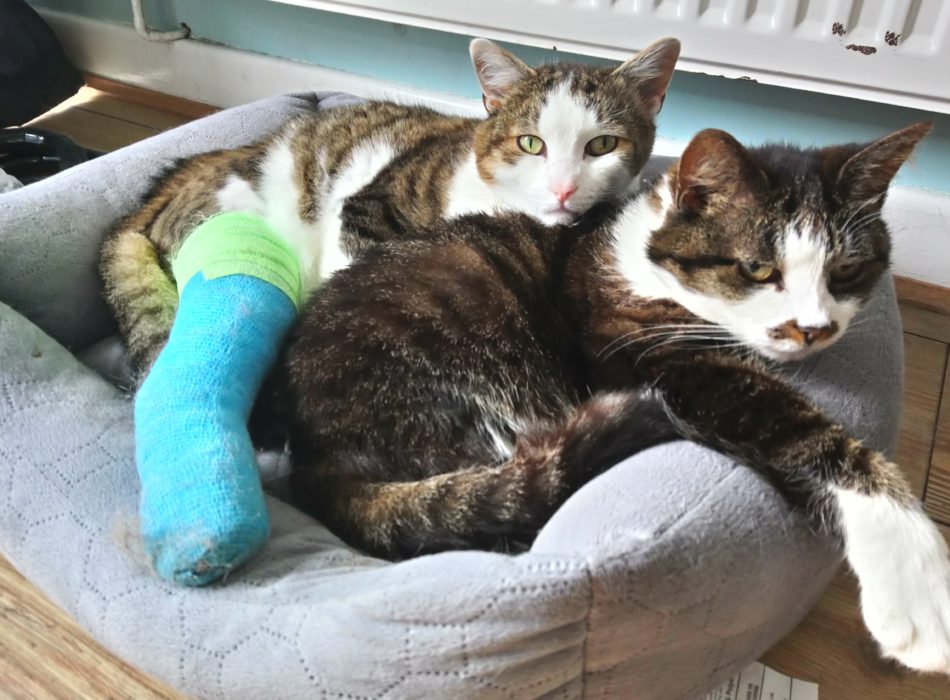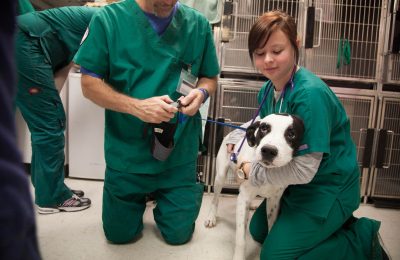Lesley S. from Banks, West Lancashire, has recently gone through the trauma of having her cat's leg amputated. One of our veterinary experts, Dr Chris Tufnell, advises her on treatment and aftercare.
Lesley writes: Max, my pet cat, has recently had his leg amputated following a diagnosis of bone cancer. This situation dates back to April this year when he fractured bones in his hind leg. After a biopsy, I discovered that Max had cancer and very quickly found myself taking him in for the operation.
Although he has made a successful recovery, this whole episode has been very upsetting, traumatic and stressful. As a pet owner, my two cats (Max and Poppy) mean the world to me and have been my companions for over 10 years.
Do you have any advice for pet parents like me facing a potential amputation and how we can help animals adapt to life afterwards? I’d also like to hear from, and talk to, other people like myself who have hopefully come out of the other side of this worrying time.

A cast doesn't stop Max from claiming his rightful place in the cat bed
irstly, I'm really sorry to hear about poor Max. Bone cancer is a very serious condition and I'm sure that having it diagnosed and coming to terms with the consequences has been an upsetting and worrying time for you. I do hope that the operation has been successful in removing the cancer.
Dogs and cats cope really well on three legs, whether it be a front or back one that they have lost. They don't suffer from the humiliation that people do from their altered appearance and so appear to concentrate on coping without the lost limb. In many cases the amputation is more of a concern for the owner than it seems to be for the animal. Being quadrupeds, they balance well on three legs and, whilst only having one front or back leg does put more pressure on that limb, they are able to quickly get used to hopping on it.
Obviously, the initial recovery from an amputation operation can be very painful as there is a considerable amount of trauma involved and it's important that there is adequate pain relief through this stage. Pain often causes changes in behaviour in cats so if you are concerned it's best to consult your veterinary surgeon on an analgesia (pain relief) plan. This might involve several types of pain relief as frequently they work very well together and you shouldn't be concerned about the amount of drugs Max is receiving over this short to medium term as the vet will have taken this into account and it's really important that we get him as comfortable as we can.
It's also very important to look after the wound carefully - your vet will instruct on this, as this can be large and it's great if we can get it to heal well. There may be drains and fluid accumulations involved but these are temporary and expected with large surgeries and shouldn't be worried about. Keeping Max comfortable is the priority.
Over the longer term, because they don't have to hunt or avoid predators, cats suffer few problems with a missing limb. There are occasional balance issues to begin with but most owners are surprised with how quickly they adapt. We can help them by grooming or scratching areas of their body that they might have used the missing limb to attend to and you shouldn't worry if the area where the missing limb was twitches when you do this.
I've known many animals live for years on three legs and frequently visitors to the house don't notice that they are missing a leg until they come close because they behave so normally. Cats may even continue to climb trees!
Best of luck with Max's recovery and please don't hesitate to consult your veterinary surgeon frequently through this worrying time as hopefully they will be able to put your mind at rest.
Has your pet recently suffered an amputation? Please comment below and share with us your experience and how your pet is adapting to their new life. What advice would you give to pet parents going through a similar ordeal?








